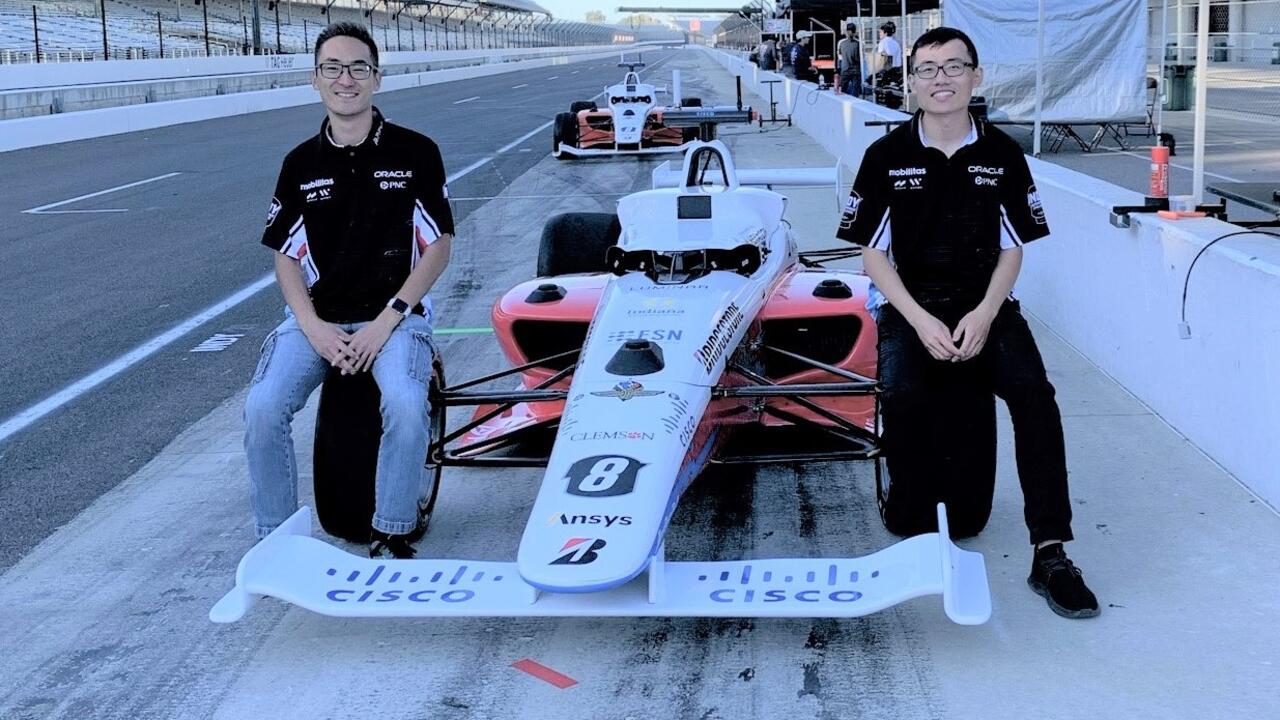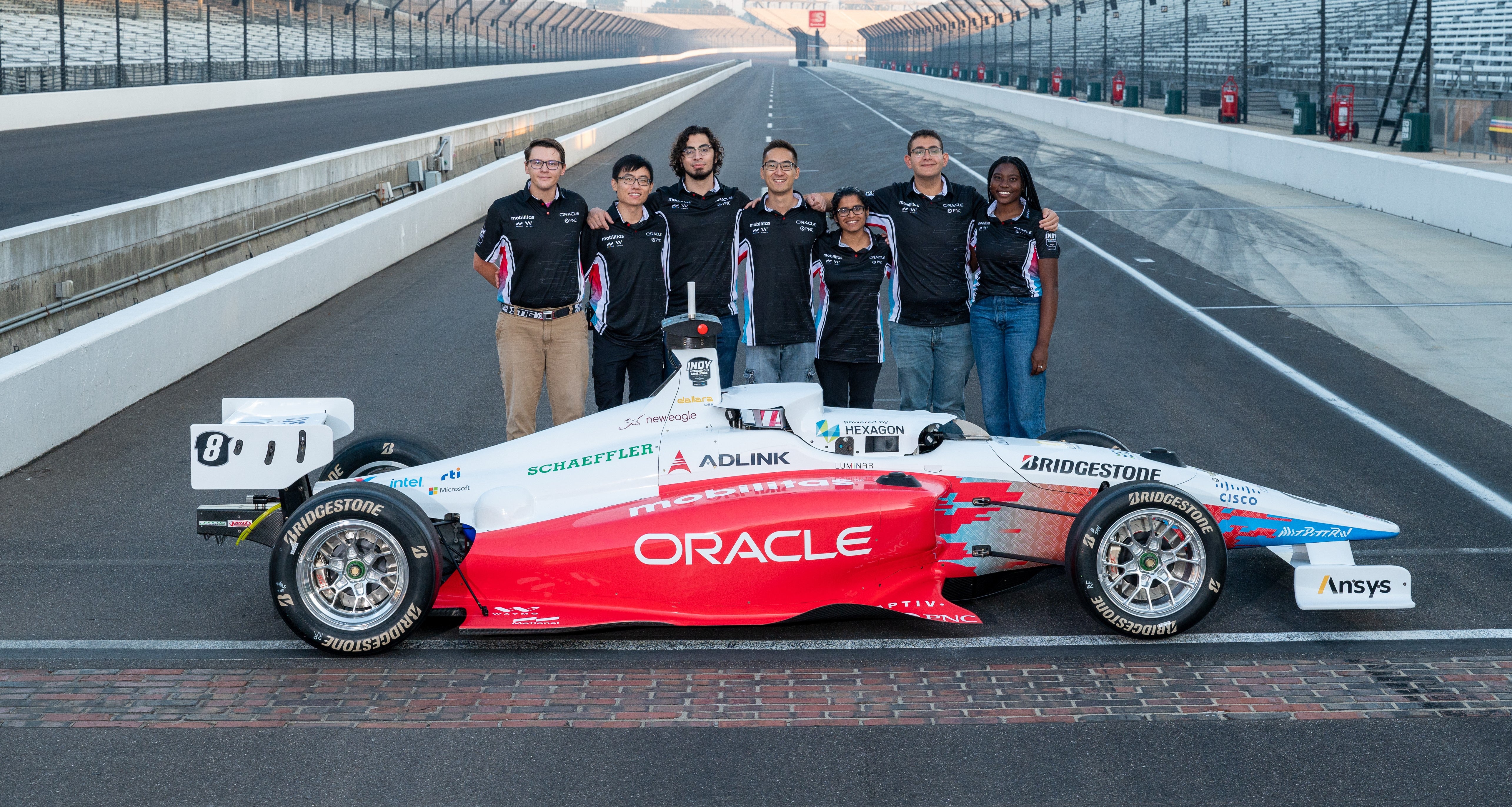
No regrets despite Indy crash
Waterloo students fail to finish, but ‘still learned a whole lot’ at historic autonomous race

Waterloo students fail to finish, but ‘still learned a whole lot’ at historic autonomous race
By Brian Caldwell Faculty of EngineeringMonths of hard work ended with a disappointing crash for two University of Waterloo students during a historic autonomous vehicle race at the Indianapolis Motor Speedway (IMS) on Saturday afternoon.
A million-dollar, self-driving racecar developed by master’s students Brian Mao and Ben Zhang with teammates from three U.S. universities hadn’t completed its warmup lap when a GPS failure led to an unscheduled left turn into an infield wall at the famed home of the Indianapolis 500.
But as they assessed the damage, analyzed what went wrong and watched the winning German team take the US $1-million top prize in the first Indy Autonomous Challenge with an average speed of almost 136 miles per hour (mph), they had no regrets.

Ben Zhang, second from left, and Brian Mao, centre, pose with teammates and their autonomous car in front of the famous yard of brick at the Indianapolis Motor Speedway.
Their team, the only student-led entry in the nine-car final, decided to go for it despite having GPS issues earlier in the day. In all, four teams crashed or failed to complete the race with similar problems.
“Of course there are some tears, some sadness, but we still feel good that we had the courage to try pushing the limits of what we could do,” said Mao (BASc ’20), who earned an undergraduate degree in mechanical engineering at Waterloo and is now working towards a master’s degree in applied mathematics.
Mao and Zhang (BCS ’20, computer science), a master’s student in electrical and computer engineering, were members of a joint team with students from the Massachusetts Institute of Technology, the University of Pittsburgh and the Rochester Institute of Technology.
They spent about six weeks in Indianapolis integrating self-driving software into a modified Dallara AV-21 car and aimed to post an average speed of 100 mph, which would have given them a fourth-place finish in an event featuring teams from around the world.
Minutes after helplessly watching their car hit the wall from their place in pit lane, Mao was already talking about trying to raise money to participate in future races.
“The crash doesn’t take away from the entire experience,” he said. “I still learned a whole lot, experienced many things, and it’s all about the journey, not just the destination. We know how to do better in the future now.”
Waterloo initially had a small team of its own called WATORACE before teaming up with other schools to pool resources and expertise. Other key members for Waterloo were software engineering undergraduate Kyle Anderson, compute science undergraduate Ryan Larkin and Rollen D’Souza, an engineering PhD student.
Cars in the livestreamed event, which was organized by Energy Systems Network and the IMS to advance technology for autonomous vehicles, were required to complete two laps as fast as possible while driving alone on the track. There was also an obstacle avoidance challenge.
The top three teams then raced again for the prize money. The Technical Institute of Munich, a team of 45 master’s and PhD students, took first place with an average speed of just under 136 mph over two laps.
A team from the University of Modena and Reggio Emilia, and the University of Pisa in Italy, ETH Zurich in Switzerland and the Polish Academy of Sciences posted an even faster one-lap average speed of 139 mph, before dramatically slowing down on the second lap due to a programming error.
The third-place car, developed by the Polytechnic University of Milan and the University of Alabama, hit a top speed of 157 mph before crashing into a wall due to a GPS failure.
“That’s amazing,” Mao said of the winning German team’s average speed. “They clearly pushed the boundaries and accomplished the real goal of this whole competition to advance vehicle technology as far as possible. I am very proud they have done that.”
The event began in 2019 with more than 40 universities and included a series of simulated races and testing leading up to Saturday’s finale.
Main photo: Brian Mao, left, and Ben Zhang pose with their autonomous racecar during testing at the Indianapolis Motor Speedway.

Read more
Redefining capstone learning by bringing students, faculty and community partners together to tackle real-world challenges

Read more
Here are the people and events behind some of this year’s most compelling Waterloo stories

Read more
From co-op to community, grads offer insights and inspiration for the next generation of students
The University of Waterloo acknowledges that much of our work takes place on the traditional territory of the Neutral, Anishinaabeg, and Haudenosaunee peoples. Our main campus is situated on the Haldimand Tract, the land granted to the Six Nations that includes six miles on each side of the Grand River. Our active work toward reconciliation takes place across our campuses through research, learning, teaching, and community building, and is co-ordinated within the Office of Indigenous Relations.